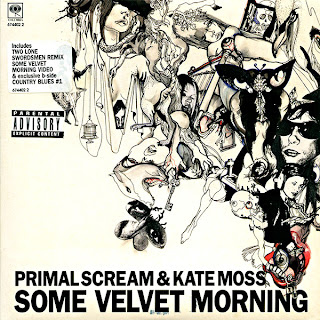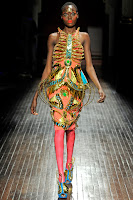"Assuming the tag line on your left has now got me the attention of even the dumbest, most ignorant little 19-year-old fashion wannabe dimwits - let the hate mail begin - I'm going to tell you a story about the next generation of fashion: the young aspirers, force-fed with Tyra Banks philosophies and fashion Fata Morganas created by The Hills."
- Anders Christian Madsen, 'Paintings for the Blind', DANSK Magazine, 24
DANSK is without doubt my favorite magazine. While I love the shoots that they do, the styling they use, hell, even the adverts they include, the main reason I buy the magazine is Anders Christian Madsen. The man is a genius, hands down. Other larger publications like Vogue, Elle, and Harper's Bazaar feel so comparatively dull for me as a reader, which is perhaps one of many reasons for the unfortunate circumstances described in one of Madsen's articles in DANSK's F/W 2010 issue (titled 'Paintings for the Blind').
Madsen describes the article as "a feature which [...] carries a journalistic and socio-critical importance so vast that it really ought to appear in The New York Times. I even got quotes and stuff." As you notice, I too took the liberty of using quotes. Why, you ask? Well, for starters, Madsen is hilarious, and it would be punishable for me not to share his words with you, reader, directly from the source. Second, I attach enormous importance to the message of the article, despite the fact that in some ways, it implicates me personally.
In a nutshell, 'Paintings for the Blind' is a piece highlighting the dilution of the fashion industry in recent years. The water that's watering it all down? The new generation. The young, fame-hungry social climbers pounding on the highest of high society's doors because they want to be "in". They want to be in fashion, not because they feel it is an outlet for artistic expression, but because in high school they were told to get a career that they would enjoy. In the absence of any other skills (actually, that's too harsh - in the absence of recognition of any other skills) they decide to take their black belt in shopping and become a fashion designer, or a stylist, or a makeup artist, etc.
From some perspectives, this is an excellent idea. You know, "HOLLA, I get to do what I love ALL DAY and get paid big money for it! My life is so not average." And they are totally right, because we all dread growing up and finding ourselves in a Chandler Bing situation. Having a job that you love makes actually working a job much more tolerable than having one that you can't stand.
The problem with this, however, is that these people are getting into the industry with absolutely no knowledge of its history, let alone the present or the future. (Just so we're clear, knowing brand names like Calvin Klein, Chanel, Versace, and Burberry do not count as 'knowing' about fashion. That's the equivalent of saying you 'know' about football, but only being able to name David Beckham, Cristiano Ronaldo, and 'that guy who headbutted the other guy that one time...') Where fashion is influenced by the past and present, and works towards the future, a career in fashion requires much more than being able to find the best deal on designer jeans, or recognize the D&G logo. Well, at least it used to.
In recent years, there have been more publically embarrassing moments in fashion than the hiring of dolt interns. Among these, Lindsay Lohan at Ungaro (cringe). The celebrity take over of fashion - of everything, really - has been well publicized. Actors used to get into music, musicians used to get into acting, and both would then cowrite an autobiography of their inspired experiences. But lately, collections have been shown by anyone who's anyone, with Justin Timberlake, Victoria Beckham, Gwen Stefani, and Sienna Miller all grabbing a piece. Oh, did I mention the Olsen twins? (I shouldn't have to. Any day now, we'll find out they've bought the Russian mafia.) Now I'm not saying that as designers, celebrities are always a bad fit, but the ease with which they manage to insert themselves into businesses makes it appear very DIY, the issue being that it promotes the idea that background isn't a necessity when pursuing a career.
So you want to be a singer? Don't worry about it, we have AutoTune to fix your voice. Not a problem, Chantal Kreviazuk and Kara DioGuardi can write all your songs for you!
Okay, I know you really want to design a fashion line... Just tell the illustrators what you want, and they'll draw it. If you need any help, the fashion forecasters will tell you what's going to be in next season. OH or you could just redo what Philo did last season... Philo... Phoebe Philo... At Celine? She does minimalism..? No, don't Wiki it, I'll call someone up.
Maybe there are some people that are okay with the overwhelming lack of talent and knowledge in many of the newcomers to various fields, but I'm not. Would you want to be defended by a lawyer who had not studied the precedents for your case? It's not even that people present with this deficiency, it's that they don't show any desire to change it. It's all about the quick fix, and sitting down to read about the history of design is not considered a component under that umbrella. As Madsen laments, "Words certainly have a daunting effect on the youngsters - at least when they appear in large quantities." Where fashion is a visually-driven business, the argument can be made that perhaps simply looking at the pictures is sufficient. And maybe it would be, if you already have the cultural foundation to properly analyze what you are seeing. Looking at Jean Paul Gaultier's F/W 2010 collection at Hermes, to take an obvious example, did you note the inspiration taken from The Avengers? Did you understand the message of Hussein Chalayan's S/S 1998 collection? Do you know what is meant by words like utilitarian, minimal, and nautical?
In order to think intelligently about fashion, to be able to look at something and understand what its purpose is, a certain degree of background is necessary. If you are not culturally informed, or are not educated in the jargon, this becomes increasingly difficult, and forces you to depend on others, thereby limiting them as well. You might scoff at this and say "Who bloody cares what the 'purpose' of it is... It's clothing! It looks nice, so you wear it, end of story" and that's all well and good if you're a corporate heavyweight, or a scientist, or a farmer. But if you are a member of the fashion industry, it is important.
Allow me to use an analogy. Those who read books often do so because they simply enjoy reading. Others are too lazy to read the book, so they go watch the movie instead. These two are equivalent to those who consume fashion on the surface level: if I like it, it's good. Then there are scholars, who read books and analyze them. They look for themes, motifs, and symbols, and all that stuff that you hated English class for. They write essays about the books, developing grandiose philosophies of life entirely based on the author's decision to use the word 'azure' instead of 'blue'. To the average person, things like word choice seem insignificant, and unworthy of much attention, but to the scholar, these small and insignificant things can be quite the opposite. The scholar is the equivalent of those who consume fashion on the semantic level: what does this piece/outfit/collection mean? If the difference still doesn't ring clear, please refer to that scene in The Devil Wears Prada.
In no way am I claiming to be a fashion genius. On the contrary, I only really became interested in fashion three years ago, and while I've learned a lot since then, I'm still not Tavi Gevinson. But I do read. I read DANSK, I read Vogue. I read foreign magazines, and get excited on the occasions when I remember enough of the language to actually understand it. I read books about the industry, I watch the fashion shows, I look at the evolutions of designers' styles over time. When lectures are less than entertaining, I sketch designs for my own yet-to-be-created collections, which I learn how to realize by reading about garment construction and design. Even though I'm not an all-knowing fashion guru, I respect the fact that knowledge is an integral part of the industry, and that is why I seek it out. So in the event that I some day apply for internship at DANSK, or Balmain, or wherever, I might be able to mount the legitimate claim that I would be an asset.
I suppose my point here is that fashion perceives itself as art. It's not materialistic, it's not just a bunch of people honing their own vanity, it's a sphere of intelligent, creative expression. Whether people outside fashion agree or disagree with this perception is of little or no consequence. So to all my fellow "19-year-old fashion wannabe dimwits," if you want to be in fashion, take it seriously and do the research. Or at least read the job description.
Peace, love, and floating,
Gill Ford
PS: DANSK Magazine is NOT looking for interns. In case you were one of the many who emailed them in response to the fake intern listing in the S/S 2010 issue.






































































































